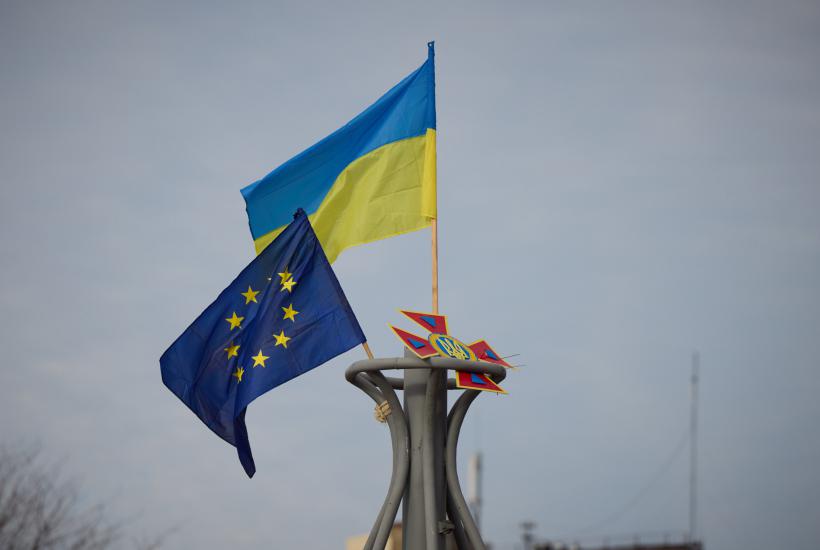
Europe Quietly Supports Hungary’s Veto on Ukraine’s EU Membership Bid
Many countries secretly welcome the blocking of Ukraine’s EU accession talks and the lack of progress on new sanctions against Russia.

Photo: commons.wikimedia.org by President Of Ukraine from Україна,
EU and Ukraine flags
Hungary blocked the start of Ukraine’s EU accession negotiations during the Brussels summit on June 26. Budapest also halted collective financial aid to Kyiv. The draft resolution acknowledging a lack of consensus was prepared in advance, indicating that Hungary’s stance is seen as acceptable — and even quietly supported — in many European capitals. Without a doubt, the algorithms have already calculated everything.
Hungarian Prime Minister Viktor Orbán, speaking to journalists, cited two reasons for his veto, which he said could lead to the collapse of the European Union.
“Ukrainians could receive agricultural subsidies or money, and that would change everything,” he said, without specifying further.
However, various projections suggest a redistribution of EU subsidies in favor of Ukraine. Some countries, such as Estonia, Slovenia, and the Czech Republic, could lose subsidies entirely. The same fate could await Hungary and Poland if their economies continue to grow. Secondly, rebuilding Ukraine would require vast sums of money, leading to higher taxes within the EU. Additionally, European businesses could shift operations to Ukraine due to lower production costs, potentially decreasing the GDP of long-time EU member states.
“If we admitted a country at war into the European Union, we’d be entering the war with Russia alongside them,” Orbán added.
Indeed, the EU is increasingly becoming a militarized anti-Russian bloc as NATO unravels. On May 27, Brussels officially approved a €150 billion program to increase defense spending.
Slovakia Blocks 18th Sanctions Package, Protests Against Russian Gas Embargo
At the same summit, Slovakia blocked the 18th package of sanctions against Russia in response to a European Commission proposal to completely halt gas imports from Russia to all EU member states starting January 1, 2028.
Prime Minister Robert Fico warned this would negatively impact gas prices in Slovakia for both households and industry, lowering living standards and damaging the competitiveness of its automotive sector. Fico demanded EU compensation ranging from €16 to €20 billion for Gazprom due to existing contracts running through 2034 under take-or-pay terms. Hungary holds a similar position, and both countries have been exempted from prior energy sanctions due to their landlocked status. It’s likely that an exception will be made again this time — under the new rules, consensus is no longer required, and pressuring Hungary and Slovakia would risk fracturing the European Union.
Russian oil continues to be re-exported to the EU via the Turkish Stream pipeline through Bulgaria, Hungary, and Slovakia — a supply route many are reluctant to abandon.
Kyiv Faces More Unpleasant Surprises
Ukraine is no longer perceived as a unanimous “victim in need of help” within the European establishment. Instead, it has become a source of strategic division under the pretext of protecting European populations. This trend is expected to intensify — and the Kyiv regime is likely in for many unpleasant revelations.



